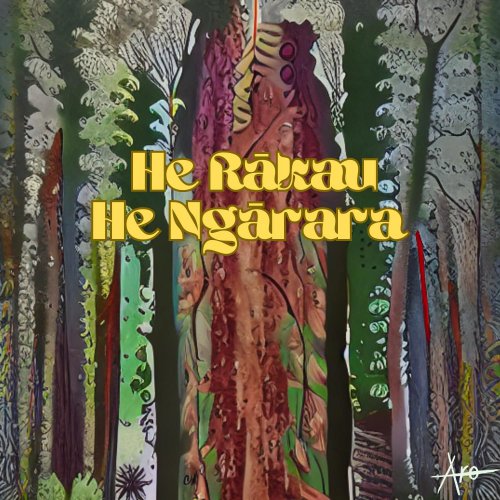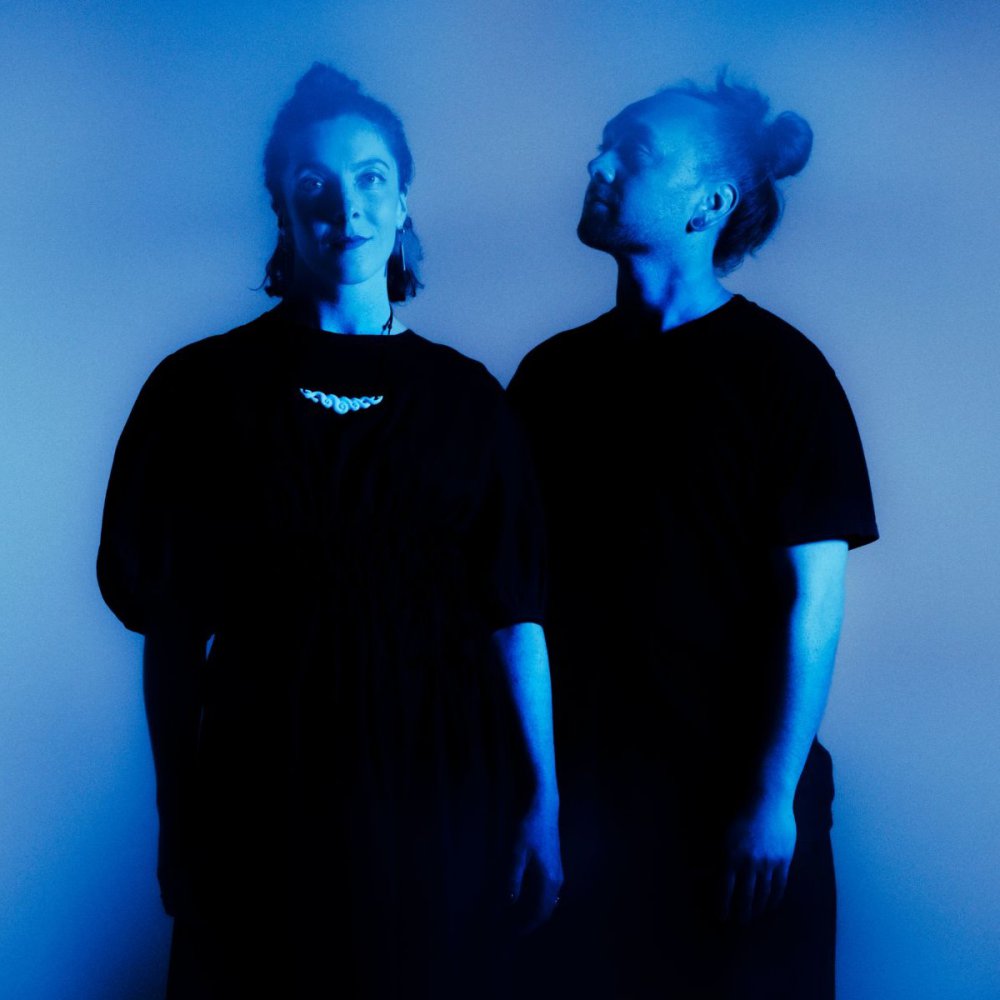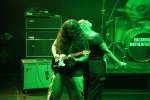Aro - Album Review: He Rakau, He Ngarara
 Tamaki Makaurau based husband & wife duo Charles & Emily Looker, otherwise known as Aro, escape genre boundaries on their fourth body of work, He Rakau, He Ngarara. Aro's waiata draw from country and folk, jazz, and shades of haka, making for a collection that often purposefully creates sonic whiplash in a stunning exploration of sound and kaitiakitanga and manaakitanga.
Tamaki Makaurau based husband & wife duo Charles & Emily Looker, otherwise known as Aro, escape genre boundaries on their fourth body of work, He Rakau, He Ngarara. Aro's waiata draw from country and folk, jazz, and shades of haka, making for a collection that often purposefully creates sonic whiplash in a stunning exploration of sound and kaitiakitanga and manaakitanga.
Opening track Mahoe Me Patate introduces listeners to the album's core theme of whakapapa and growing alongside one's family and natural world. Emily's honeyed vocal tones kick things off, smooth and relaxed with a subtle jazz lean. She's soon backed by a chanted gang vocal that opens up the soundscape, creating the sensation that Aro are making this project alongside the spirits of generations gone by. Indeed, it's a project shaped by many hands. Recorded live in studio with producer Vivek Gabriel and citing a long list of musical performers outside of the Lookers alone, there's a consistent live feel that makes each song feel lived-in and from the heart.
Nonetheless, there's a real charisma to when Aro strip back to just a duo. The charismatic harmonies on Totara emphasise their strong connection, as not only partners in music but in life. Pukatea opts for a laidback country style, softly opening with light acoustic guitars and slides, then blossoming into an expansive full band finale. This is one of the record's most from the heart moments in its textured, soulful melodies. And its real-world approach is exactly what makes the following track, Namupoto, so beautifully jarring. This tune is heavily synth-based, opting for a dark and gritty sound blended with a lyrical desire to build a legacy. Emily's powerful voice twists and turns, not so much the lead of the track but a deeply ingrained part of its instrumental. Even better, there's a fierce guitar solo outro that instantly transforms Namupoto into one of the album's true standouts.
But the greatest feature of He Rakau, He Ngarara is Pounui, which Aro rightfully describe as the heart of the album. The performance switches between Charles' deep, smoky chanting, and the incredibly atmospheric sounds of nature and taonga puoro. There's an eerie quality to the finished product that makes Charles' vocal all the more hard-hitting. As its centerpiece, Pounui locks in on the unmistakably Aotearoa sound of the record, and the most crucial messages and ideas Aro seek to convey.
The infectious upbeat melodies on Tatarakihi switches things up again. Contrasting the darker songs before it, this one simmers with the heat of the Kiwi summer. Ukuleles, brass flourishes and chirping crickets litter the production, breathing life into the album right at the point where it begins to slow. The slick grooves of Weta follow, a track that emphasises an impressive pop sensibility in its dreamy hook. "I hear the starlight calling out into the night", Aro sing together. By this point in He Rakau, He Ngarara, the sonic palette has traversed many a genre. But what brings it all together is the deep-rooted cohesion and unity between Emily and Charles Looker, so palpable you can almost see it.
Aro's collective research into matauranga Maori, and involvement from members of the duo's iwi and hapu, makes for a breathtaking musical collection in He Rakau, He Ngarara. It is a carefully constructed, multifaceted journey through indigenous culture in the modern day. But this album's selling point is not its overall sound or theme. What makes this record so enjoyable is the raw passion on display between Emily and Charles Looker, who simply know how to make beautiful, rich, powerful music.
About Aro

Visit the muzic.net.nz Profile for Aro
Releases
Other Reviews By Danica Bryant
 Alba Rose - EP Review: First Light
Alba Rose - EP Review: First Light
12 Dec 2024 // by Danica Bryant
Kiwi soul pop creative Alba Rose has dropped her first international release after relocating to Berlin, the new EP First Light. Gaining popularity as the frontwoman of Corduroy before taking off on her solo endeavours, Rose has increasingly found success on the NZ charts and festival circuit.
Read More...
 Adam Hattaway & The Haunters - Album Review: High Horse
Adam Hattaway & The Haunters - Album Review: High Horse
07 Nov 2024 // by Danica Bryant
Marking their sixth album in six years, High Horse is the latest impressive release from Christchurch powerhouses Adam Hattaway and the Haunters. Unlike the boisterous rock and roll ventures which precede it, High Horse is an intimate, eerie project made with a small group of collaborators.
Read More...
 Tess Liautaud - Album Review: Blue Mind
Tess Liautaud - Album Review: Blue Mind
25 Oct 2024 // by Danica Bryant
As the modern musical generation dive headfirst into digital production, home studios and the art of the solo performance, it’s hard to remember the days of the traditional, all-out band jam session. But Tess Liautaud’s beautiful sophomore record Blue Mind proves that lifestyle is alive and well in Otautahi.
Read More...
 Claudia Robin Gunn - Album Review: Little Wild Learning
Claudia Robin Gunn - Album Review: Little Wild Learning
16 Sep 2024 // by Danica Bryant
The art of writing children's music is deceptively harder than people might expect. The songs are easy to listen to and lyrically simple, but they must incorporate educational vocabulary, introduce new ideas about life, and maintain a catchiness that gives young listeners a fun experience, rather than one that could be overwhelming.
Read More...
 Nur Peach - Album Review: Syncopate
Nur Peach - Album Review: Syncopate
21 Jun 2024 // by Danica Bryant
Coromandel Peninsula's Nur Peach is fresh off a bachelor's degree in Pop Music and is immediately "gathering momentum" to realize her dream of releasing an album. Syncopate is an eclectic pop-folk and adult contemporary record full of motivational coming-of-age material, produced in collaboration with Auckland's Scott Seabright.
Read More...
 Valere - EP Review: Gold Dust
Valere - EP Review: Gold Dust
10 Jun 2024 // by Danica Bryant
Christchurch performer Valere has built an impressive catalogue over the past decade, and her latest EP Gold Dust is no exception. Informed by recent years of experiences with motherhood, marriage and familial love and loss, Valere rediscovered the simplicity of songwriting on the guitar, and has now shared six powerful tracks motivated by this artistic return.
Read More...
17 Mar 2024 // by Danica Bryant
By some miracle, Homegrown 2024 hits a home run and finds Welly on an infamous good day this Saturday, 16th March. That sun is blazing down as the fairground rides and colourful outfits roll out onto the waterfront.
Read More...
 Amiria Grenell - Album Review: The Winter Light
Amiria Grenell - Album Review: The Winter Light
12 Mar 2024 // by Danica Bryant
Otautahi folk singer Amiria Grenell boasts many accolades to her name, and her new album The Winter Light will surely add to the pack. This is a cozy collection of classic folk songs, grounded in nature, family and the endless search for true peace.
Read More...
Most Viewed Artists
Latest Galleries
NZ Top 10 Singles
- APT.
ROSÉ And Bruno Mars - DIE WITH A SMILE
Lady Gaga And Bruno Mars - BIRDS OF A FEATHER
Billie Eilish - TASTE
Sabrina Carpenter - I LOVE YOU, I'M SORRY
Gracie Abrams - ESPRESSO
Sabrina Carpenter - SAILOR SONG
Gigi Perez - LOSE CONTROL
Teddy Swims - A BAR SONG (TIPSY)
Shaboozey - GOOD LUCK, BABE!
Chappell Roan














 Report A Problem
Report A Problem

